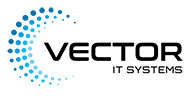Introduction
In today's digitally interconnected world, businesses must prioritise cybersecurity to safeguard their assets and maintain trust with clients and stakeholders. This case study delves into the story of how our client, a Human Resources Company that fell victim to a devastating breach of access control. The lack of multi-factor authentication (MFA) and weak internal controls led to a substantial financial loss through the exploitation of the payroll system. This case study outlines the measures that Vector, and our specialist cyber security partner, implemented to remediate the situation and fortify the HR company’s cybersecurity posture.

Background
The HR company, a trusted provider of HR services, including recruitment and payroll, to numerous organisations had been operating efficiently for over 15 years, and build a solid and respected reputation. However, the increasing complexity of their operations, combined with the growing threat landscape, created vulnerabilities that had gone unnoticed until it was too late.

The Challenge
The HR company faced a major cybersecurity challenge when an attacker exploited a breach of access control, leading to significant financial loss. The key issues contributing to this breach were: • Lack of Multi-Factor Authentication (MFA): The HR company did not have MFA in place, which made it easier for unauthorised individuals to circumvent password based authentication, and gain access to sensitive systems and data. • Weak Segregation of Duties: The company lacked proper separation of duties, allowing a single user to have excessive access to the payroll system, increasing the risk of unauthorised actions. • Inadequate Independent Checks: There was a lack of independent verification or audit checks to detect and prevent unauthorised or fraudulent transactions.
The Solution
Vector, and our specialist cyber security partner, was called in when the HR company realised the severity of the breach and the financial loss it had incurred. With the company’s reputation on the line and clients at risk, we deployed a comprehensive strategy to address the immediate crisis and prevent future incidents. 1. Rapid Incident Response. Our incident response team swung into action immediately, isolating compromised systems and containing the threat. We conducted a thorough analysis to understand the extent of the breach and the attacker's methods. 2. Forensic Analysis. To trace the attacker's steps and identify any residual threats, we performed a detailed forensic analysis. This step was crucial to uncover any hidden vulnerabilities or backdoors that could be exploited in the future. 3. Data Recovery and Financial Reconciliation. We worked closely with the comany to recover as much lost data as possible. Simultaneously, we assisted in reconciling financial records to assess the extent of the financial loss accurately. 4. Implementation of Multi-Factor Authentication (MFA. Recognising the critical role MFA plays in enhancing security, we swiftly implemented MFA across the companies critical business systems. This measure significantly reduced the risk of unauthorised access. 5. Redefining Access Controls. We conducted an extensive review of the company’s access controls and segregation of duties. By creating a more robust access control framework, we minimised the likelihood of a single individual having undue access to sensitive systems. 6. Independent Auditing and Monitoring. To address the lack of independent checks, we recommended and implemented a continuous auditing and monitoring system. This provided real-time insights into system activities and flagged any unusual or suspicious behaviour. 7. Employee Training and Awareness. We conducted cybersecurity awareness training for the company’s employees to ensure they could recognise and report potential threats, thereby reducing the risk of social engineering attacks.
Results
The collaborative efforts of Vector, and our specialist cyber security partner, the Human Resources company produced remarkable results, not only mitigating the immediate crisis but also strengthening the company’s overall cybersecurity posture: 1. Financial Recovery. Through diligent financial reconciliation and data recovery efforts, we managed to recover a significant portion of the financial loss incurred by the company. 2. Enhanced Security. The implementation of MFA, improved access controls, and continuous auditing measures significantly enhanced the company’s security posture. It became much more difficult for unauthorised individuals to gain access to sensitive systems. 3. Robust Internal Controls. With a well-defined segregation of duties and independent checks in place, the HRC was better equipped to prevent future breaches and unauthorized transactions. 4. Empowered Workforce. The cybersecurity awareness training instilled a heightened sense of responsibility among company employees. They became proactive in recognising and reporting potential threats, reducing the organisation's vulnerability to social engineering attacks. 5. Ongoing Partnership. Our engagement with the company did not conclude with the resolution of the immediate crisis. We established an ongoing partnership to provide continuous cybersecurity monitoring and support, ensuring that their defences remained strong and adaptable.

Conclusion
This case study illustrates how Vector, and our specialist cyber security partner, can play a pivotal role in rescuing a business from the brink of a cybersecurity disaster and fortifying their defences for the future. The Human Resources company's experience serves as a powerful reminder of the importance of proactive cybersecurity measures, strong internal controls, and continuous vigilance in an increasingly complex threat landscape.
Cybersecurity is not a one-time investment but an ongoing commitment to protecting an organisation's digital assets and reputation. The HR company’s journey demonstrates that with the right expertise and comprehensive measures in place, it is possible to not only recover from a cybersecurity breach but also emerge stronger, more resilient, and better prepared to face future threats. In an age where cyberattacks are a constant threat, businesses must prioritise cybersecurity as an integral component of their operations to safeguard their financial well-being and the trust of their clients.


